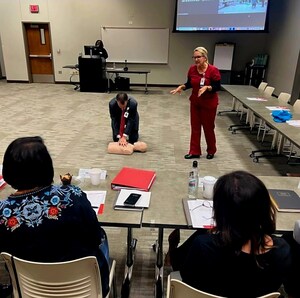Study Highlights:
- Higher consumption of red meat sharply increases the risk of heart disease.
- Substituting fish, poultry, low-fat dairy products and nuts significantly decreases the risk of heart disease.
- This 26-year study in women shows the benefits of shifting sources of protein away from red meat.
DALLAS, Aug. 16 /PRNewswire-USNewswire/ -- American women who ate more protein-rich foods instead of red meat had a significantly lower risk of developing heart disease, according to a study reported in Circulation: Journal of the American Heart Association.
(Logo: http://photos.prnewswire.com/prnh/20100222/AHSALOGO )
(Logo: http://www.newscom.com/cgi-bin/prnh/20100222/AHSALOGO )
Eating more fresh red meat, processed red meat and high-fat dairy carried an increased risk of heart disease in the study. Women who had two servings per day of red meat compared to those who had half a serving per day had a 30 percent higher risk of developing coronary heart disease.
"Our study shows that making substitutes for red meat or minimizing the amount of red meat in the diet has important health benefits," said Adam M. Bernstein, M.D., Sc.D., the study's first author and post-doctoral research fellow in the Department of Nutrition at Harvard School of Public Health in Boston.
The data also showed that eating more servings of poultry, fish and nuts was significantly associated with a decreased risk of coronary heart disease. Compared to one serving each day of red meat, women who substituted other protein-rich foods experienced significantly lower risk of coronary heart disease:
- 30 percent lower risk with one serving each day of nuts
- 24 percent lower risk with one serving each day of fish
- 19 percent lower risk with one serving each day of poultry
- 13 percent lower risk with one serving each day of low-fat dairy products
"There are good protein-rich sources that do not involve red meat," Bernstein said. "You don't need to have hot dogs, hamburgers, bologna or pastrami, which are all fresh or processed meats."
The study examined 84,136 women, 30 to 55 years old, in the Nurses' Health Study over 26 years, from 1980 to 2006. The majority of women were Caucasian.
Researchers examined the medical history and lifestyles of these women, including diet, with questionnaires issued regularly throughout 26 years. Detailed dietary information included a 61-item food frequency questionnaire, which researchers later expanded to 116 food items.
Nurses were asked how often they had consumed a unit or portion of each food on average during the previous year. Nine possible responses included from "never" to "more than six times daily."
The primary endpoint of the study was non-fatal heart attack and fatal coronary heart disease, from 1980 up to June 1, 2006. During that time, researchers documented 2,210 non-fatal heart attacks and 952 deaths from coronary heart disease.
The study differs from others in the field because the analysis has a 26-year follow-up, greater precision in dietary measurements due to a great number of cases and repeated dietary questionnaires. It also differs because of the emphasis on substitution patterns and substitution of other protein-rich foods for red meat.
"Although this study included only women, our overall knowledge of risk factors for heart disease suggests that the findings are likely to apply to men as well," Bernstein said.
"Those who are concerned and want to reduce their risk of heart disease should consider replacing red meat with other protein-rich foods including fish, poultry, low-fat dairy products and nuts," Bernstein said.
Co-authors are Qi Sun, M.D., Sc.D; Frank B. Hu, M.D., Ph.D.; Meir J. Stampfer, M.D., Ph.D.; JoAnn E. Manson, M.D., Ph.D.; and Walter C. Willett, M.D., Ph.D.
Statements and conclusions of study authors published in American Heart Association scientific journals are solely those of the study authors and do not necessarily reflect the association's policy or position. The association makes no representation or guarantee as to their accuracy or reliability. The association receives funding primarily from individuals; foundations and corporations (including pharmaceutical, device manufacturers and other companies) also make donations and fund specific association programs and events. The association has strict policies to prevent these relationships from influencing the science content. Revenues from pharmaceutical and device corporations are available at www.americanheart.org/corporatefunding.
NR10 – 1107 (Circulation/Bernstein)
Additional Resources:
- Downloadable stock footage and animation available at www.americanheart.mediaroom.com. Click on Multimedia and Broadcast" under resources.
- AHA Recommendation: Meat, Poultry and Fish.
CONTACT: For journal copies only, |
|
please call: (214) 706-1396 |
|
For other information, contact: |
|
Karen Astle: (214) 706-1392; [email protected] |
|
Bridgette McNeill: (214) 706-1135; [email protected] |
|
Julie Del Barto (broadcast): (214) 706-1330; [email protected] |
|
SOURCE American Heart Association
WANT YOUR COMPANY'S NEWS FEATURED ON PRNEWSWIRE.COM?
Newsrooms &
Influencers
Digital Media
Outlets
Journalists
Opted In






Share this article